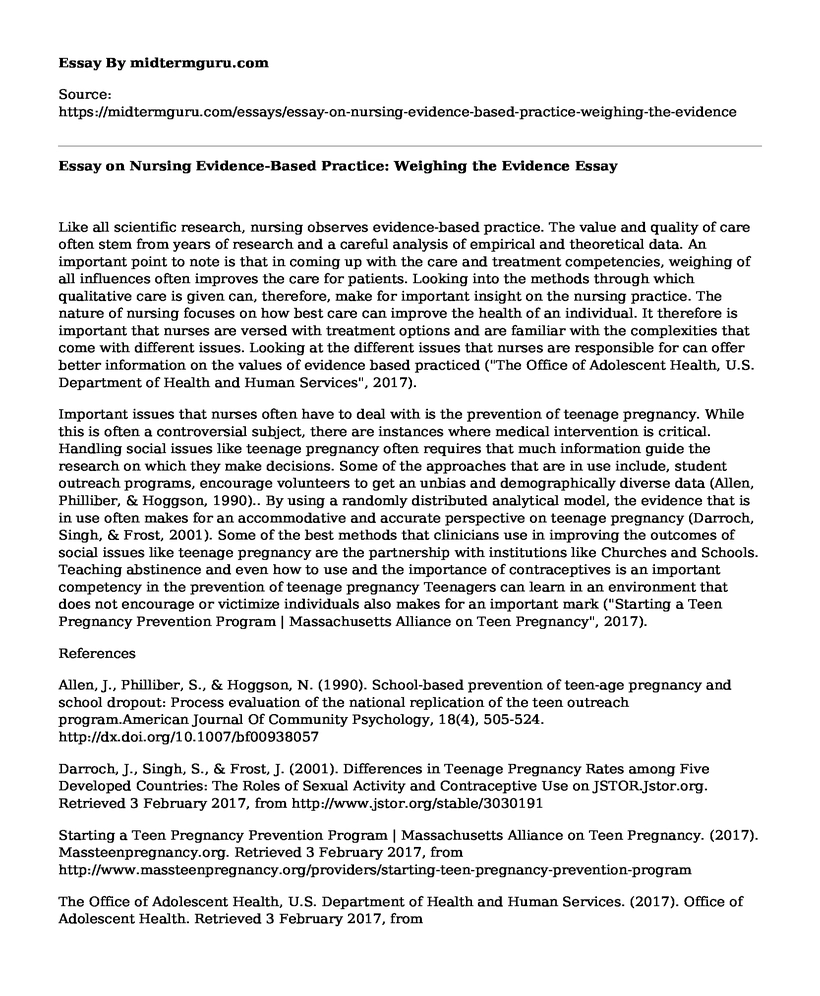Like all scientific research, nursing observes evidence-based practice. The value and quality of care often stem from years of research and a careful analysis of empirical and theoretical data. An important point to note is that in coming up with the care and treatment competencies, weighing of all influences often improves the care for patients. Looking into the methods through which qualitative care is given can, therefore, make for important insight on the nursing practice. The nature of nursing focuses on how best care can improve the health of an individual. It therefore is important that nurses are versed with treatment options and are familiar with the complexities that come with different issues. Looking at the different issues that nurses are responsible for can offer better information on the values of evidence based practiced ("The Office of Adolescent Health, U.S. Department of Health and Human Services", 2017).
Important issues that nurses often have to deal with is the prevention of teenage pregnancy. While this is often a controversial subject, there are instances where medical intervention is critical. Handling social issues like teenage pregnancy often requires that much information guide the research on which they make decisions. Some of the approaches that are in use include, student outreach programs, encourage volunteers to get an unbias and demographically diverse data (Allen, Philliber, & Hoggson, 1990).. By using a randomly distributed analytical model, the evidence that is in use often makes for an accommodative and accurate perspective on teenage pregnancy (Darroch, Singh, & Frost, 2001). Some of the best methods that clinicians use in improving the outcomes of social issues like teenage pregnancy are the partnership with institutions like Churches and Schools. Teaching abstinence and even how to use and the importance of contraceptives is an important competency in the prevention of teenage pregnancy Teenagers can learn in an environment that does not encourage or victimize individuals also makes for an important mark ("Starting a Teen Pregnancy Prevention Program | Massachusetts Alliance on Teen Pregnancy", 2017).
References
Allen, J., Philliber, S., & Hoggson, N. (1990). School-based prevention of teen-age pregnancy and school dropout: Process evaluation of the national replication of the teen outreach program.American Journal Of Community Psychology, 18(4), 505-524. http://dx.doi.org/10.1007/bf00938057
Darroch, J., Singh, S., & Frost, J. (2001). Differences in Teenage Pregnancy Rates among Five Developed Countries: The Roles of Sexual Activity and Contraceptive Use on JSTOR.Jstor.org. Retrieved 3 February 2017, from http://www.jstor.org/stable/3030191
Starting a Teen Pregnancy Prevention Program | Massachusetts Alliance on Teen Pregnancy. (2017). Massteenpregnancy.org. Retrieved 3 February 2017, from http://www.massteenpregnancy.org/providers/starting-teen-pregnancy-prevention-program
The Office of Adolescent Health, U.S. Department of Health and Human Services. (2017). Office of Adolescent Health. Retrieved 3 February 2017, from https://www.hhs.gov/ash/oah/adolescent-health-topics/reproductive-health/teen-pregnancy/strategies-and-approaches.html
Cite this page
Essay on Nursing Evidence-Based Practice: Weighing the Evidence. (2021, Jun 01). Retrieved from https://midtermguru.com/essays/essay-on-nursing-evidence-based-practice-weighing-the-evidence
If you are the original author of this essay and no longer wish to have it published on the midtermguru.com website, please click below to request its removal:
- Project of Improving Nurses Practice Paper Example
- Essay on Autism Spectrum Disorder
- Essay Sample on Salicylic Acid and Aspirin
- Memory, Learning, Creativity and Intelligence Interrelation - Essay Sample
- County Health Rankings: Grading US Counties on Health Status - Essay Sample
- 6 Million Americans Affected by Congestive Heart Failure - Essay Sample
- Revolutionizing Diabetes Management: The Power of mHealth - Essay Sample







